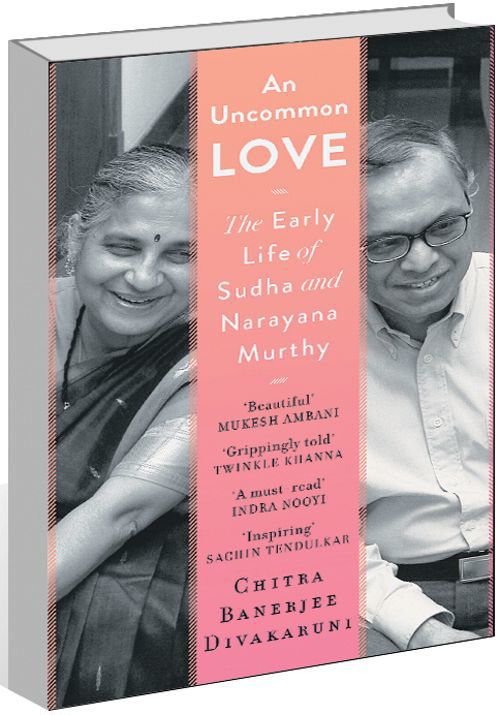An Uncommon Love by Chitra Banerjee Divakaruni. Juggernaut. Pages 352. Rs 799
Book Title: An Uncommon Love
Author: Chitra Banerjee Divakaruni
Aradhika Sharma
Narayana Murthy, who was usually conservatively dressed and mild-mannered, decided to wear a red shirt, a symbol of communism, when he went to meet Sudha’s father for the first time. He responded defiantly to Dr Kulkarni’s question about his goals in life by saying, “Maybe I will contest elections and start my own political party.” The meeting did not go well. However, Sudha and Murthy did get married and their union gave birth to Infosys.
The two first bonded over their love for books. Sudha sensed that there was a straightforwardness in him (Murthy) that, as a straightforward woman herself, resonated with her. “That is how Sudha Kulkarni, 24, and Narayan Murthy, 28, began a relationship that would open the doors of aspiration for many young people from similar middle-class backgrounds and ultimately change the face of entrepreneurship and philanthropy in India.”
The book tells the love story of two brilliant individuals from different backgrounds who overcame life’s challenges to create a strong partnership that has lasted for over five decades: the serious, idealistic and brilliant Narayana Murthy and the pragmatic, cheerful and competent Sudha. “I want you to be like the trapeze artiste in a circus and take a spectacular leap,” she tells him when he’s contemplating founding Infosys. “I’m willing to be your safety net.” True to her word, Sudha made personal and professional sacrifices.
Murthy was raised with socialist ideals inspired by Jawaharlal Nehru and his father’s principles. However, he realised that pure socialism was not practical for India. He then developed his “compassionate capitalism” ideology and became committed to bringing prosperity and greatness to his country. Murthy often went against accepted norms, navigating the difficult paths of ‘Licence Raj’prevalent in Indian business before liberalisation, sceptical government officials and demanding clients. He had the vision to establish a multinational information technology company in India that would provide various services when the concept was unfamiliar in India. Despite several setbacks, including the failure of Softronics, their first startup, Infosys Limited was eventually founded by six partners. It now has a significant global presence and employs hundreds of thousands of people.
Sudha, meanwhile, quietly challenged several male-dominated fields. She was the only female student in her class of 150 students at BVB College of Engineering in Hubli. Later, she became the first female engineer at TELCO. At both places, she had to work twice as hard to earn respect from her colleagues for her impressive talent.
Divakaruni's book tells the story of Sudha and Narayana Murthy’s formative years, including their courtship, early marriage, parenthood, and the period leading up to the founding of Infosys in Bangalore. The author’s narrative paves the way for Murthy’s journey to becoming the “Father of the Indian IT sector”. Sudha navigated several roles — from being an engineer to one of the country’s beloved authors.
Divakaruni is known for her exceptional ability to write historical fiction. In this book, she tells the story of the Murthy family, infusing drama, humour and joy into the narrative. She depicts the Murthys’ ethical values and their commitment to transparency in business, hard work, discipline, philanthropy, innovation, providing opportunities to fellow Indians and equality.














